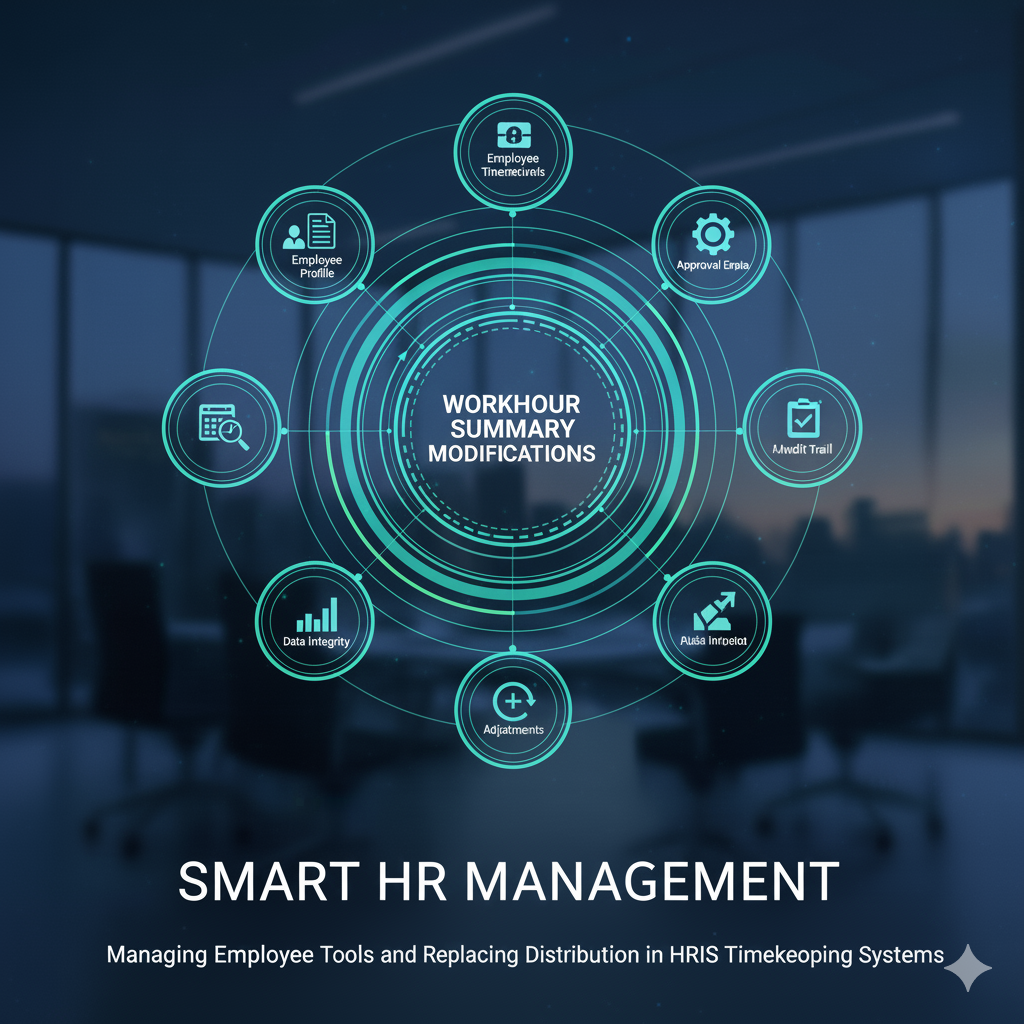Accurate tracking of employee workhours is one of the most critical tasks for any HR department. Every minute worked contributes to payroll computation, overtime tracking, and compliance reporting. However, errors and inconsistencies in time logs are inevitable — whether due to manual entry mistakes, late punches, or shift changes.
This is where HRIS (Human Resource Information System) timekeeping tools play a vital role. These tools not only automate daily time computations but also allow HR personnel to modify employee workhour summaries with transparency and control. The result? A more efficient, accurate, and accountable HR process.
Let’s explore how HRIS timekeeping systems manage employee workhour summary modifications and why this feature is essential for modern workforce management.
What Is an Employee Workhour Summary in HRIS?
An employee workhour summary provides an overview of an employee’s total hours worked over a given period — including:
🕗 Regular hours
⏰ Overtime hours
🌙 Night differential hours
🎉 Holiday or rest day hours
🚫 Absences and undertime
This summary becomes the foundation of payroll computation and compliance reporting. When errors or exceptions occur, HR teams must have the ability to review and adjust these summaries accurately — and that’s where HRIS timekeeping modification tools make a difference.
Why Workhour Summary Modifications Are Necessary
Even in automated systems, there are scenarios that require HR intervention, such as:
- Employees forgetting to clock in or out
- System interruptions in biometric devices
- Shift swaps or schedule changes
- Misclassified day types (e.g., holiday vs. regular day)
- Correction of previously approved timesheets
Without a reliable way to modify workhour summaries, these small inconsistencies can cause major payroll discrepancies and compliance issues.
How HRIS Timekeeping Systems Manage Workhour Summary Modifications
- Centralized and Accurate Time Data
HRIS timekeeping systems consolidate attendance data from all sources (biometric scanners, online logs, and manual entries) into one platform. HR personnel can then view, verify, and modify the employee’s workhour summary in real time. - Flexible Modification Features
Authorized HR staff can adjust daily or total workhour values to reflect accurate attendance data. These systems allow recalculation of:
- Regular hours
- Overtime hours
- Deductions for absences or tardiness
- Special computations for holidays or night differentials
This ensures the workhour summary always aligns with the company’s actual attendance and payroll policies.
- Automated Recalculation for Payroll
Once modifications are made, the HRIS automatically recomputes payroll data based on updated summaries. This reduces manual work and prevents inconsistencies between attendance and salary records. - Audit Trail for Every Change
Transparency is key in HR operations. Every adjustment to a workhour summary is logged in an audit trail that records:
- Who made the change
- When it was made
- What values were modified
This provides accountability and supports compliance with labor laws and company regulations.
- Role-Based Access Control
To prevent unauthorized edits, HRIS systems use role-based permissions — only authorized HR administrators or supervisors can modify employee workhour summaries. This safeguards sensitive payroll and attendance data.
Benefits of Modifying Workhour Summaries in HRIS Timekeeping Tools
| Benefit | Description |
| Accuracy | Corrects errors to ensure payroll precision and employee satisfaction. |
| Efficiency | Reduces time spent on manual verification and recalculation. |
| Transparency | Tracks every modification with complete audit logs. |
| Compliance | Meets labor law requirements for proper recordkeeping. |
| Flexibility | Allows HR teams to adapt to dynamic schedules and work setups. |
Best Practices for Managing Workhour Summary Modifications
- Set Clear Policies – Establish standard procedures for modifying workhour summaries, including required approvals.
- Train HR Personnel – Ensure that authorized staff understand how to properly review and adjust data.
- Review Audit Logs Regularly – Monitor the audit trail to detect any irregular changes.
- Integrate with Payroll Systems – Sync updates automatically to prevent discrepancies in pay.
- Use System Alerts – Set notifications for missing logs or invalid entries to reduce manual corrections.
Why HRIS Timekeeping Systems Are the Future of Workforce Accuracy
With today’s distributed teams and hybrid work setups, manual attendance management is no longer sustainable. HRIS timekeeping systems enable HR professionals to monitor, modify, and maintain accurate workhour data effortlessly.
By automating these processes and providing modification flexibility, HR departments can focus on higher-value tasks — such as performance management, employee engagement, and organizational growth.
Simply put, smart timekeeping in HRIS isn’t just about tracking hours — it’s about building a foundation of trust, accuracy, and efficiency in every organization.
Conclusion
Managing employee workhour summary modifications in HRIS timekeeping systems ensures every minute worked is properly recorded and compensated. Through automation, flexibility, and transparency, HRIS tools empower HR teams to maintain fairness, accuracy, and compliance effortlessly.
For organizations striving toward smarter workforce management, adopting a robust HRIS timekeeping solution is no longer optional — it’s essential.

